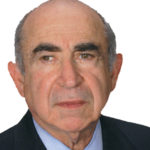2009 Honoree International DI Society W. Harold Petersen Lifetime Achievement Award
2015 Honoree of NAILBA’s Douglas Mooers Award for Excellence
With the help of Victor Cohen, this is part of our ongoing series with Eugene Cohen, founder of the Eugene Cohen Insurance Agency, Inc., 2009 Honoree International DI Society W. Harold Petersen Lifetime Achievement Award, 2015 Honoree of NAILBA’s Douglas Mooers Award for Excellence.
From time to time we will feature an interview with Eugene, who has dedicated 60 years of his life to learning, teaching, and supporting brokers in the agency’s quest to help consumers protect their income from the tragic effects of a disability.
Disability insurance (DI) is one of those products that can change the trajectory of an individual and a family’s life and is crucial for every financial planner and insurance professional to learn about and offer to clients.
Victor: We’re going to focus today’s conversation on what I know is one of your very favorite disability insurance topics—the small business owner.
Eugene: There are so many fantastic disability insurance products designed just for the small business owner. It’s exciting.
Victor: When you say, “small business,” how are you defining a small business?
Eugene: We’re talking about a business with usually anywhere from eight to twelve full-time employees. But it could have less. Here are some examples of the kind of small businesses we mean—a small clothing boutique, a small accounting firm, a small dental practice, law practice, architecture firm, an engineering firm, a small restaurant. The list of businesses is endless.
Victor: What makes the small business owner’s DI needs so different than let’s say a non-business owner’s DI needs?
Eugene: Great question. Let’s take a closer look at the small business owner. They have worked hard to build a business. They invested dollars and/or may have taken out a loan. The owner has often put in endless hours—night and day to develop and build their successful business.
That business may be the most valuable asset the owner has. It could be more valuable than their home and automobile. That business needs to be protected.
I want you to close your eyes and imagine what would happen to that business owner—the power that makes the business run—if they became disabled due to becoming hurt or sick? What would happen if they were out of work for six months, a year, maybe two years?
Victor: The business would likely be in trouble.
Eugene: That business could suffer terribly. It could even go away. But…it doesn’t always have to be that way—not if a business owner has perhaps a business overhead expense policy.
Victor: This is in addition to having an individual disability insurance policy, right?
Eugene: Absolutely. An individual DI income protection policy will take care of some of the business owner’s personal bills, what I call “Life’s noncancelable financial obligations.” We all have those expenses, regardless if one is a business owner or non-business owner.
We’re talking expenses, such as monthly rent, or a mortgage payment, utilities, groceries, loan payments, car payments, insurance premiums…those life expenses that keep coming. Every month.
Let’s say your client has an individual disability insurance policy with a monthly benefit of $10,000. With the premium being paid with after-tax dollars, the benefit will be most likely tax free.
I think of an individual disability insurance policy as a client’s silent business partner. It’s working when the owner can’t work because of their disability.
It’s very important to have those life expenses covered with an individual DI policy. But remember, your client is a small business owner. So what other expenses do they have?
Victor: Business expenses that they can be responsible for?
Eugene: Right—what I call, “business noncancelable financial obligations.” The monthly office rent, utilities, employee salaries, property and payroll taxes, perhaps rental equipment, and other qualified expenses.
A business overhead expense policy may even perhaps allow the salary of an employee hired to take on the owner’s duties while the owner is disabled, as a possible eligible expense. Of course, this would depend on the policy provisions.
The business overhead expense policy provides reimbursement of qualified monthly eligible fixed business expenses, like the ones I just mentioned and other expenses.
Visualize this. You have a client who owns a boutique clothing store with six employees and a store manager. The owner is the buyer, the owner is the store’s top salesperson, the owner trains and supervises their employees and the owner has other important responsibilities.
If the owner became sick or hurt, revenue could slow up substantially. It’s possible that the business could have a hard time surviving without the owner.
Soon, those bills would start rolling in. The business overhead expense policy will cover qualified business expenses for a short time—typically paying benefits for twelve months, eighteen months, or twenty-four months—depending on the benefit options offered by the carrier and of course chosen by the policyholder.
When I started my agency, I had to sign an office lease to guarantee the rent. I realized how important it was to have a business overhead expense policy. I already owned a disability income protection policy, but wanted a policy to assist with the office expenses I was assuming.
Victor: Another specialized DI product for business owners is a disability key person policy. Why do you think that is often important for a business owner to have?
Eugene: Many times a business owner will have an extremely important person working at their business—a key person critical to the success of the business. Often, this person has been with the business for a long period of time. If that key person were suddenly not working due to a disability, that could hurt the business tremendously.
Take a small computer company for example with a top salesperson with the connections and relationships that account for a large percentage of the company’s sales. If that key person were seriously disabled due to a sickness or accident, it could create a financial crisis for the business. To help protect a business owner from this type of situation, many business owners purchase a key person DI policy on their key employee.
The business owns the policy, with the business owner paying the premium.
If the key employee were to get sick or hurt with a qualified disability…after the policy’s elimination period, typically, the benefit would be paid to the employer and could be used for various purposes such as to hire and train a new employee to replace the disabled key person.
Victor: Eugene, I can’t believe how fast this conversation has flown by. Unfortunately, we have to wrap things up. Can’t thank you enough for sharing your invaluable insights.
Eugene: Thank you, Victor. Always a pleasure.
Victor: Are there any final thoughts you would like to add before we meet next time?
Eugene: In situations where you have two or more owners of a business, I highly recommend looking into disability buyout insurance policies for the owners. Just like a life buy-sell agreement may be funded by a life insurance policy, there is a disability buyout insurance product. When a business partner has a significant total disability which triggers the buy-sell agreement, the disability buyout policy could provide funds to assist in the buyout.
We encourage producers to talk to their disability specialists and learn about these products because they are often extremely important for small business owners to own.





























